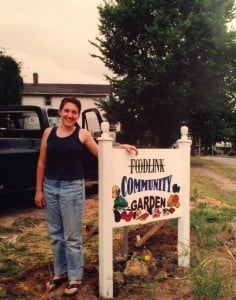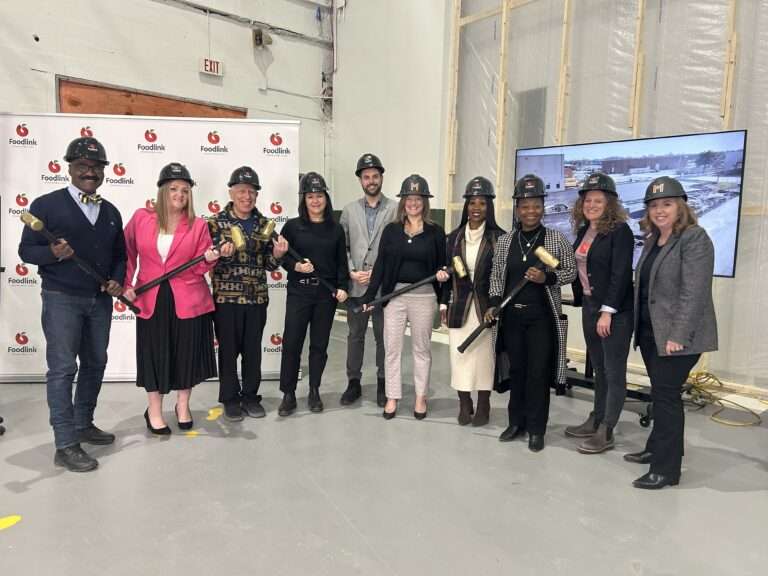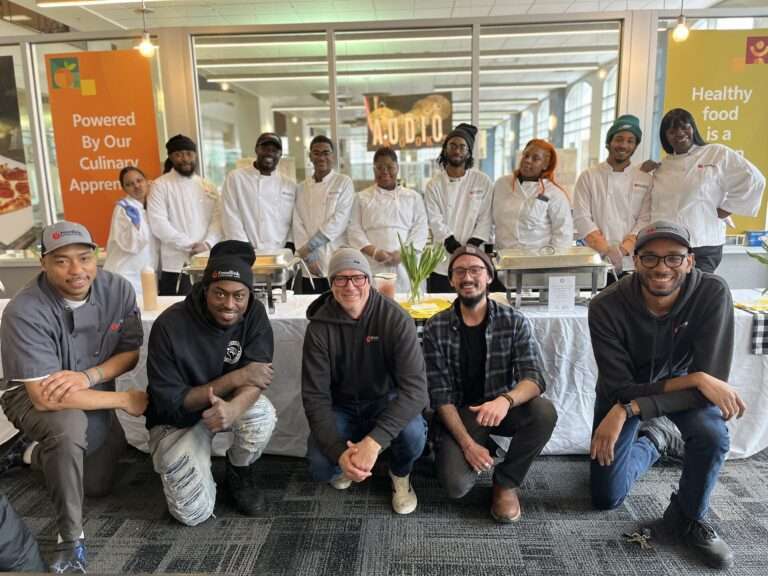On May 28, the United States Conference of Bishops announced that Bethany Welch, a Rochester native, is the recipient of the Cardinal Bernardin New Leadership Award. The national award recognizes a Catholic who is a leader in fighting poverty through community-based solutions. Welch is a former Foodlink employee who is now founding director of the Aquinas Center in Philadelphia, PA. She is dedicating her award to Foodlink’s late founder, Tom Ferraro. “My time at Foodlink rerouted my entire life trajectory,” Welch told me. “I can’t say enough about how I was changed by being part of the Foodlink team.” Here is more of my interview with Welch, her experiences at Foodlink and working with Tom, and what this award means to her.
Tell us a bit about your background and what you did while at Foodlink?
Welch: I started at Foodlink as a summer intern in 1999 while I was studying graphic design and communication at Roberts Wesleyan College. That first summer position led to a full time job after I graduated in the summer of 2000. I worked mainly on public relations and development at first, then moved into managing volunteers, and eventually policy and advocacy work, such as coordinating the regional portion of the Hunger in America study in 2001 and working with different legislators to get language in the Farm Bill for support for flash freezing. I went to grad school at University of Rochester and then on to Philadelphia to be an AmeriCorpsVISTA, but kept doing special projects for Tom part time. For example, I designed the first Freshlink logo and worked on the Farm to Fork initiative with Senator Clinton’s staff early on in the project.
What did you learn from your experiences at Foodlink and working with Tom Ferraro?
Welch: Tom was so passionate about finding creative, action oriented solutions to society’s most pressing issues. He didn’t simply sit around and talk about big ideas; he pursued change with a determination that sometimes overwhelmed those around him. Tom taught me so much about being a leader, about modeling what you expected from your team. I never wanted to let him down or to be found wanting. I attempted every challenge he gave me, even when I lacked the confidence or experience for the task at hand. As a result, I quickly became aware of how much one person could do to change broken systems. I consider Tom to be my first professional mentor. He gave me opportunities, believed in me even when I doubted my potential, and affirmed my desire to unite faith with action and to join scholarship with practice.
Describe the Aquinas Center and the work you are doing today?
Welch: Aquinas Center is located in a diverse, multilingual, multicultural community in a very densely populated inner city neighborhood in Philadelphia, PA. The center started as a conversation about an empty building. A priest, whom I had worked with on many community development projects on and off over nine years, called me in the summer of 2012 to come and see a former convent that was sitting largely vacant on the grounds of St. Thomas Aquinas Catholic Church. Msgr Shields knew that I was passionate about the responsibility the Church has to be good stewards of the real estate they have in the inner city. I had done my dissertation research on the potential for adaptive reuse of church property to further community development in blighted areas. We looked at the old convent and talked about what the community wanted and needed. I went home that night and didn’t sleep. I ended up typing about five pages of ideas of what could be possible in the 8,500 square foot building. Later that summer I went to present these ideas to the parish finance council and left the meeting with the job of creating what is now Aquinas Center where our mission is to: Build unity in diversity, support learning, and inspire thoughtful action. We live this out through the values of hospitality, responsiveness, solidarity, and transformation.
Aquinas Center offers a wide range of programs that empower and benefit the local immigrant community as well as urban immersion experiences that invite youth and adults to come join neighbors in working to revitalize the neighborhood. This adaptive re-use of a former convent represents the kind of creativity and stewardship of church property that we need to combat the effects of poverty, blight, and discrimination. Shared meals, collaborative work projects, and intentional dialogue put people of different backgrounds side by side creating what Pope Francis calls a culture of encounter. All service and volunteer groups work side by side with community residents in order to try to break the cycle of poverty tourism or the belief that people need to be saved. Everyone has dignity. Everyone has gifts to share. Leadership training and organizing efforts increase the capacity of immigrants and allies to advocate for comprehensive immigration reform at the city, state, and federal levels.
What does the award mean to you?
Welch: The award is named for Cardinal Joseph Bernardin who died in 1996. He demonstrated tremendous leadership on behalf of the poor and worked to build bridges across ethnic, class, and age barriers. Cardinal Bernardin began his ministry at a young age and was ordained a bishop while still in his thirties. His example is inspiring to me. I am so humbled and honored to be selected as someone who might strive to live like he did. Aquinas Center is sitting at the intersection of the very same issues he confronted. Every day we welcome neighbors and guests who come from incredibly different backgrounds and experiences, yet desire to be in relationship with one another.
Why did you decide to dedicate the award in Tom Ferraro’s memory?
Welch: The conference of bishops say about Cardinal Bernardin that his gift was a vision to build consensus “that doesn’t just settle for what already exists, but moves us ahead to what is possible.” Doesn’t that sound exactly like Tom Ferraro? How many times did he dream up an idea that started with trays of English muffins, an empty building, an empty truck, or a vacant lot? How often did he see beyond what was already being done in order to cast a vision for what could be? Moreover, when the committee notified me about winning the award, they expressed that I demonstrated, “a great understanding of how to integrate faith into her work—to make her life, her work and her faith cohesive.” That is something I think Tom did every single day without even pausing to think about it and I wanted this award to celebrate that way of living.
What do you see doing in the future?
Welch: Right now I am focused on what we are doing in South Philly on one city block! I have ten bright eyed, enthusiastic college interns arriving in the next few days to spend the summer at Aquinas Center. Each one of them could have been me showing up at the Exchange Street building in May 1999. I want to share with them that legacy of engagement that Tom preached through actions. I want to help them realize their potential to fight for justice, one block at a time. In the more distant future, I’m hoping to work with other parishes and dioceses to broaden the vision of what could be! There are so many ways that these old buildings can become the foundation of a stronger urban communities.







